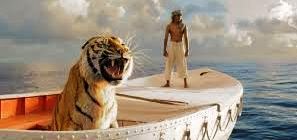Must Religion Be Boring?

In the movie, Life of Pi, a writer comes to visit Canadian Piscine Molitor Patel, who is named after the French word for swimming pool. The writer says he was told Piscine “will tell you a story that will make you believe in God.” Piscine, nicknamed Pi, replies: “I will tell you my story. You can decide for yourself whether to believe in God.” Pi proceeds to tell a fantastic parable about growing up in India where his parents owned a zoo. Forced to leave India , his parents packed the family and the zoo animals – including a Bengal tiger named Richard Parker – onto a ship bound for a new life. The ship is wrecked in a storm, his family is lost and Pi finds himself on a lifeboat with Richard Parker. After an excruciating eternity afloat, where he endures more storms and attacks by Parker, Pi survives to tell his story. Whether Pi’s story had any effect on the writer’s faith isn’t disclosed, but the religious theme of the movie is undeniable. One of its main points see...



